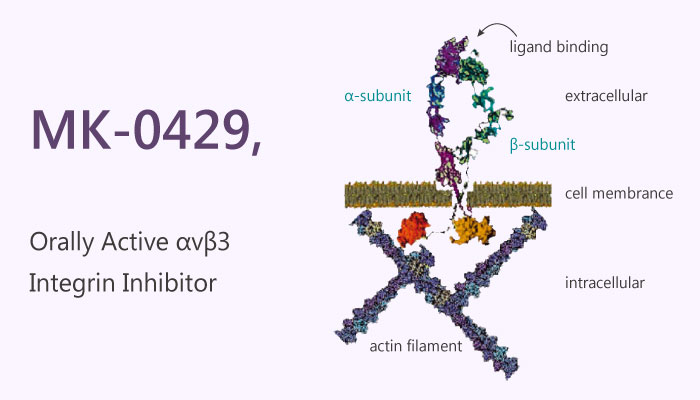
Integrins are cell surface protein receptors with α and β subunits. They participate in multiple cellular functions such as adhesion and anchoring to extracellular matrix, transducing growth factor signals. Emerging evidence has demonstrated that integrins play a critical role in kidney diseases. Modulation of integrin function can lead to pathophysiological processes associated with diabetic nephropathy such as alterations in the glomerular filtration barrier and kidney fibrosis. The changes imply that multiple integrin subtypes might need to be targeted to ameliorate the progression of renal disease. MK-0429 is a potent and selective small molecule inhibitor of the αvβ3 integrin.
This inhibitor was originally in development for the treatment of osteoporosis. Robust preclinical evidence demonstrated that it potently inhibited binding of the ligand to the purified human integrin αvβ3. In another study, MK-0429 has demonstrated dose-dependent inhibition of fibrosis marker gene expression in kidney fibroblasts. Those fibrosis markers are direct downstream targets of TGF-β signaling. MK-0429 exerts strong anti-fibrotic effects likely due to the modulation of some or all of the latent TGF-β-binding integrins. Moreover, in the obese ZSF1 rat model of diabetic nephropathy, chronic treatment with MK-0429 results in significant reduction in proteinuria, kidney fibrosis, and collagen accumulation.
Pickarski , et al evaluated its potential in the prevention of melanoma metastasis. Treatment at 100 and 300 mg/kg reduced the number of metastatic tumor colonies by 64 and 57%, respectively. The high dose also reduced the tumor area by 60% as compared to the vehicle. MK-0429 was safe and efficacious in significantly decreasing melanoma metastasis in the lungs. The results emphasized the potential of MK-0429 as a potential therapeutic agent for the prevention of metastatic melanoma.